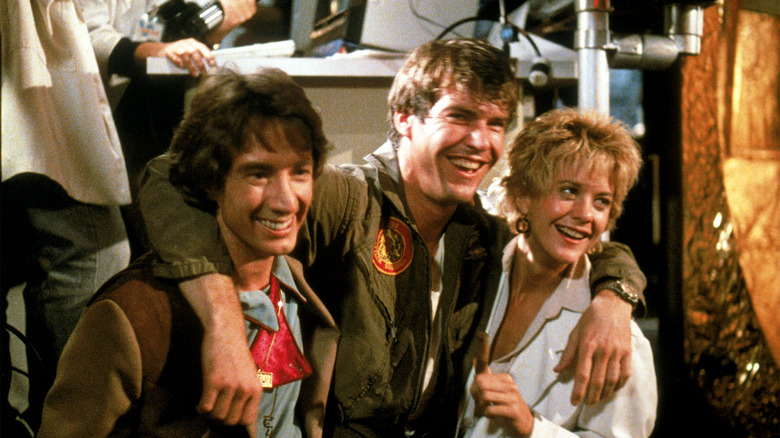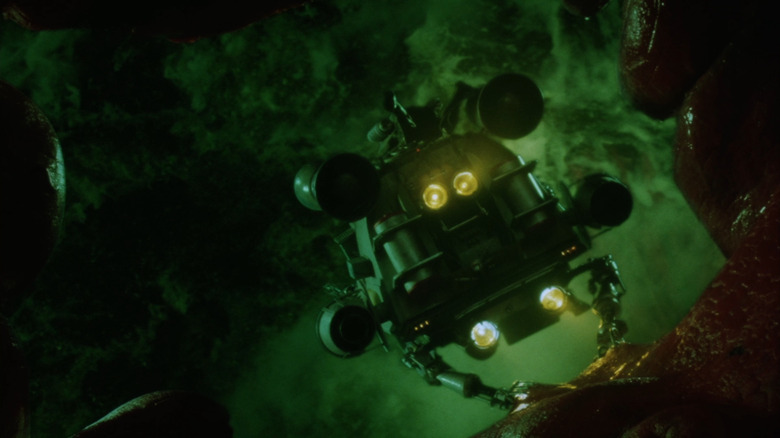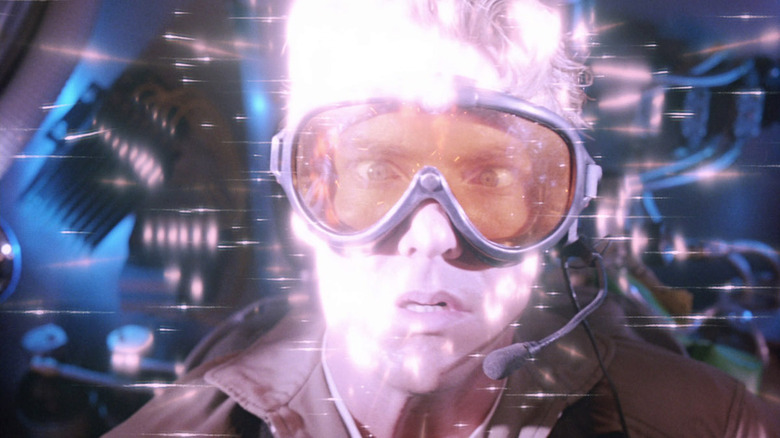Joe Dante's Innerspace Didn't Start Its Life As A Comedy
The modern-day version of the pitch that sold director Joe Dante on "Innerspace" would be something like this: What if we shrank Dwayne Johnson to miniature size and injected him into Kevin Hart's body? I'd probably watch that, and it was the kind of high concept that was in abundance in '80s Hollywood.
It's a fun idea that resulted in a neat movie. "Innerspace" is a likable combination of comedy and adventure, Oscar-winning special effects, and terrific chemistry between its three leads. Dennis Quaid plays Tuck Pendleton, a hard-drinking Navy pilot who quits his job to take part in a top-secret miniaturization experiment. The plan is to inject him and his tiny submersible into a rabbit, but bad guys raid the lab and he ends up injected into the butt of neurotic grocery store clerk Jack Putter (Martin Short) instead. With the villains on their trail, Jack and Tuck's girlfriend Lydia (Meg Ryan) have 24 hours to restore Tuck back to his normal size before he runs out of oxygen.
One of the smartest things about "Innerspace" is how it flips the usual hero and sidekick roles. Dennis Quaid, forever under Harrison Ford's shadow, is pretty helpless as Tuck; all he can do is sit around in his sub and give Jack advice. Meanwhile, the hypochondriac nerd played by Short does all the leading man stuff like fighting bad guys, kissing the girl, and getting involved in car chases. It's a clever role reversal and Short carries the movie nicely, handling the action surprisingly well and delivering most of the laughs with his goofy energy.
The sci-fi comedy formula may be what makes "Innerspace" such an endearing movie, but it didn't start out as a comedy at all, and the lack of laughs made Joe Dante walk away at first
How Innerspace went from spy thriller to sci-fi comedy
"Innerspace" began life as a screenplay by Chip Proser which, by his own admission, was "basically a rip off of 'Fantastic Voyage.'" It was also supposed to be a serious spy movie, which turned Joe Dante off when he was first sent the screenplay in 1984. He remembers (via Cinema Retro):
"When I was first offered it, the script had no comedy at all. I didn't think it worked that way so I went off and did something else. When I came back, they had a new writer and he approached it as comedy from the concept of what would happen if we shrank Dean Martin down and injected him inside Jerry Lewis. That was a concept I could relate to."
That concept was the approach taken by "The Dead Zone" screenwriter Jeffrey Boam, who was tasked to rewrite the script by the producers at Warner Bros. He had a blast with it (via AssignmentX):
"It was such a goofy idea that there were no limits to it... I felt I could do anything, and so the script I wrote was very loony and far out there but everybody loved it. Dick Donner, Joe Dante, John Carpenter and even Steven Spielberg wanted to do it. So when Steven wanted to do it, Warner's thought I was a God and any amount of money it would take to do the movie they would spend. Steve ultimately decided he only wanted to produce so Joe came along and really latched on to the idea."
In its new guise, "Innerspace" had all the hallmarks of another smash hit for Amblin Entertainment, Spielberg's production company, and just about everyone thought it worked better as a sci-fi comedy. Everyone apart from the paying public, that is.
Innerspace flopped before finding its true audience
With a sizeable budget of $27 million, "Innerspace" was one of 1987's most expensive movies, especially considering the return: It only made back $25.9 million at the box office (via Box Office Mojo). That came as a shock to Dante and the producers after very positive test screenings, and the director later blamed the failure on the film's ad campaign and title (via Den of Geek):
"Although audiences liked it in theatres – when I went, they were in stitches – the ad campaign was so terrible for that movie. It was just a giant thumb with a little tiny pod on it. You couldn't tell that it was a comedy – you couldn't tell anything – and it had a terrible title because we could never figure out a better one."
The studio tried re-marketing it with a better poster, but the damage was already done. Luckily, the home rental market was booming and, like many '80s box office duds that failed to find their audience in theaters, "Innerspace" fared far better on VHS and became a minor cult item. That's how I first came to it, and it's a real nostalgia piece for me. In the UK, it always seemed to be on TV around the holidays when I was growing up. It was one of those movies we'd all watch as a family, enjoy the hell out of it, then totally forget about it until the next time it was on. And there's certainly a place for movies like that.


